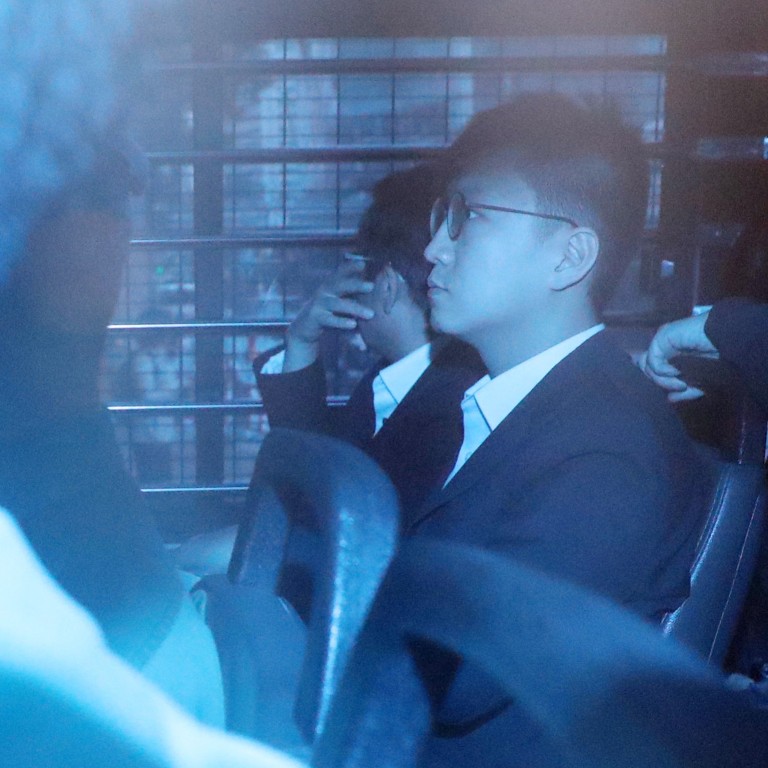
Former separatist leader Edward Leung found not guilty of additional Mong Kok riot charge
- Unrest shook major shopping district of Hong Kong in February 2016
- Leung, a former spokesman of political group Hong Kong Indigenous, already jailed over same incident
One of the faces of Hong Kong’s diminished pro-independence movement was acquitted on Friday of a second charge of rioting, three years after the violent unrest that gripped the popular Mong Kok shopping district.
Edward Leung Tin-kei, formerly the spokesman of political group Hong Kong Indigenous, burst into joyful tears when a jury found him not guilty, by 7 to 2, of rioting in Portland Street on the night of February 8, 2016.
Despite his acquittal, Leung headed back to prison, where he is already serving time for his role in another outbreak of violence that same night on Argyle Street.
He was convicted of one count of rioting and pleaded guilty to another of assaulting a police officer during an earlier trial that ended in June last year. Leung was serving a six-year jail term while in the dock for the present trial, which stemmed from the jury’s failure to reach a verdict on an earlier riot charge.
It took the jury of five women and four men more than 43 hours – spanning five days – to reach a string of verdicts on Friday for Leung and his three co-defendants following a marathon trial that lasted more than 70 days
Explainer: charting the course of Hong Kong’s rioting laws
Two of Leung’s co-defendants, technician Vincent Lam Ngo-hin, 23, and Lee Nok-man, 21, unemployed, walked free, to the cheers of their supporters in the public gallery. But a third defendant, delivery man Yung Wai-ip, 34, was found guilty of three of the seven charges he faced, being acquitted of three others.
The trial centred on the night of chaos of February 8, 2016 – which carried over into the next morning – that began with a row on Portland Street between hawker control officers and street food vendors, backed up by their supporters.
The incident was dubbed the “fish ball revolution” as the vendors were selling the local snack at the time, though some argued it went beyond support for the hawkers.
Pundits said it was a more radical means of fighting the government, after a more peaceful pro-democracy campaign, the 2014 Occupy protests, failed to move the local and Beijing governments.
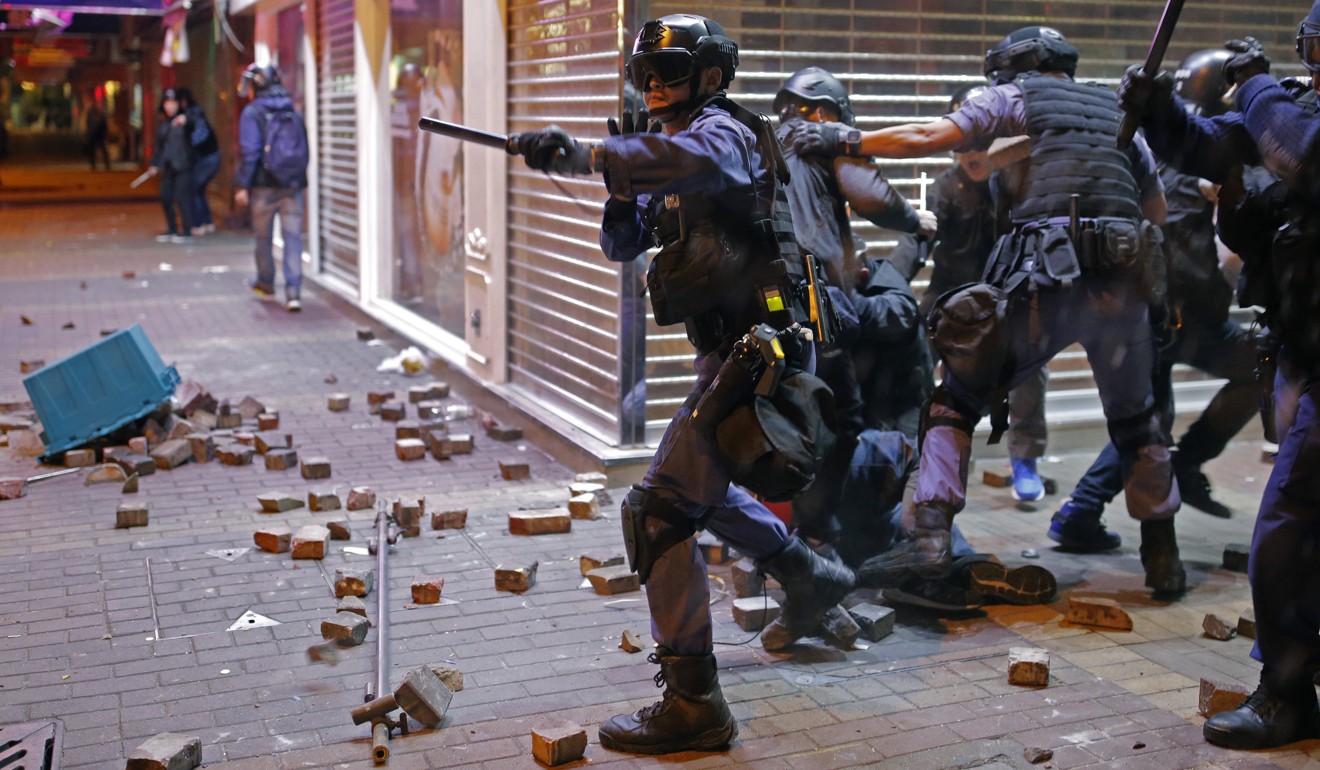
The scuffles quickly escalated into violent clashes, during which angry mobs hurled objects at police, who used pepper spray and batons to disperse them. The clashes spread to neighbouring streets including Nathan Road, Soy Street and Fa Yuen Street.
Protesters lit fires in the streets and attacked officers with bricks, wooden crates and other items. A policeman drew his gun and fired two warning shots in the air as he tried to protect an unconscious colleague.
Last year, Leung, now 27, and his co-defendants, technician Vincent Lam Ngo-hin, 23, and Lee Nok-man, 21, unemployed, were put on trial for their parts in the incident. While Leung was acquitted of charges accusing him of inciting the unrest, the jury found him guilty of taking part in it, for which he was sentenced to six years in jail. He also pleaded guilty to assaulting a police officer.
No British-style probe for Mong Kok riot, Carrie Lam says
But jurors at the time failed to reach a verdict on a joint riot charge that involved the three, for their acts at an earlier stage of the incident in Portland Street. So they were put on trial again in November, with a new co-defendant, Yung.
On Friday, Leung’s co-defendants Lam and Lee were each found not guilty of one count of rioting by a 7-2 verdict.
But Yung was found guilty of two counts of rioting and one of assaulting a police officer by a verdict of 8 to 1. He was acquitted of two other counts of rioting and one of inciting an unlawful assembly. The jury was unable to reach a verdict on an additional charge of taking part in an unlawful assembly on the day. A spokesman from the Department of Justice said it would not comment on whether they would seek a retrial for Yung, citing the ongoing proceedings as a reason.
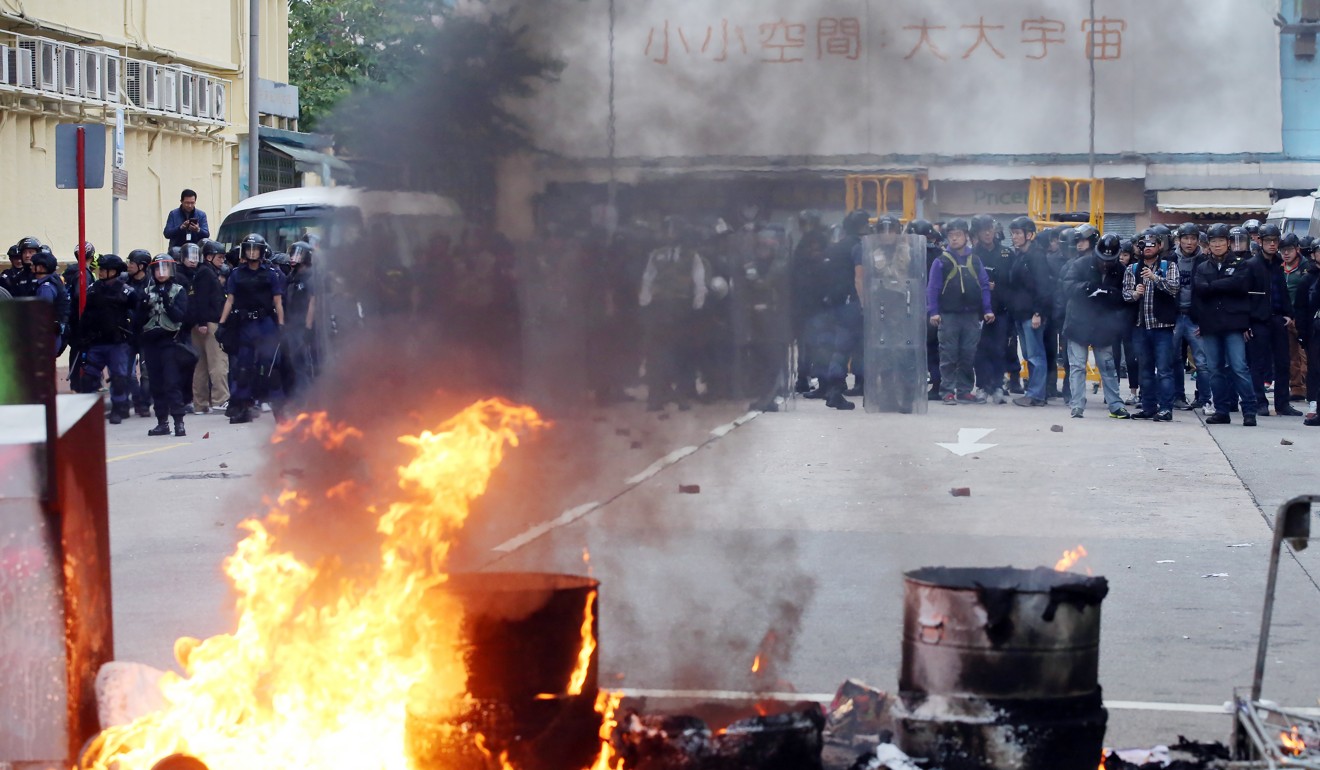
A fourth co-defendant, Yuen Chi-kui, 28, pleaded guilty at the start of the trial to two counts of rioting and one of arson.
The court was adjourned to April 4 for mitigation on Yung and Yuen. Yung was remanded in custody.
The prosecutors said Leung took part in the riot at Portland Street by encouraging the crowd through a megaphone. He also took part in the clashes, they said.
But Leung told the jury during the trial he was only trying to ease the tension between the police and the crowd at the time.
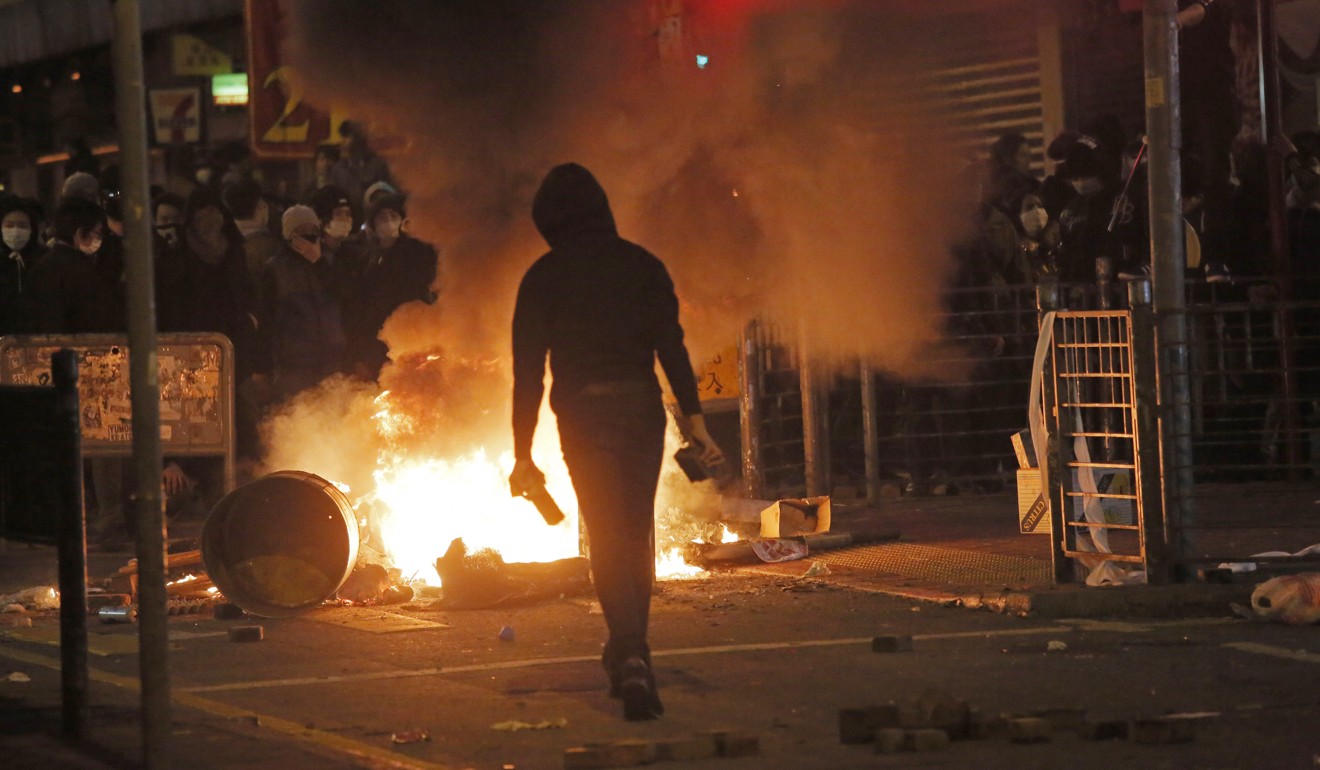
Outside the court, Lee Nok-man thanked the jury for taking a weight off his back. He said that he regretted, to a certain extent, what happened on that February night because it had affected his family. He would not say whether he would take part in any future protests.
Lam described the experience as a torment, having gone through two trials in the past 13 months. “My mind went blank [upon hearing the verdict],” he said.
Leung’s counsel David Ma Wai-kwan called the outcome reasonable, saying that Leung could now feel relieved. Leung is expected to be released on January 19, 2022. His appeal against conviction and sentence has yet to be scheduled.
Barrister Douglas Kwok King-hin, for Yung, said his client would consider an appeal.
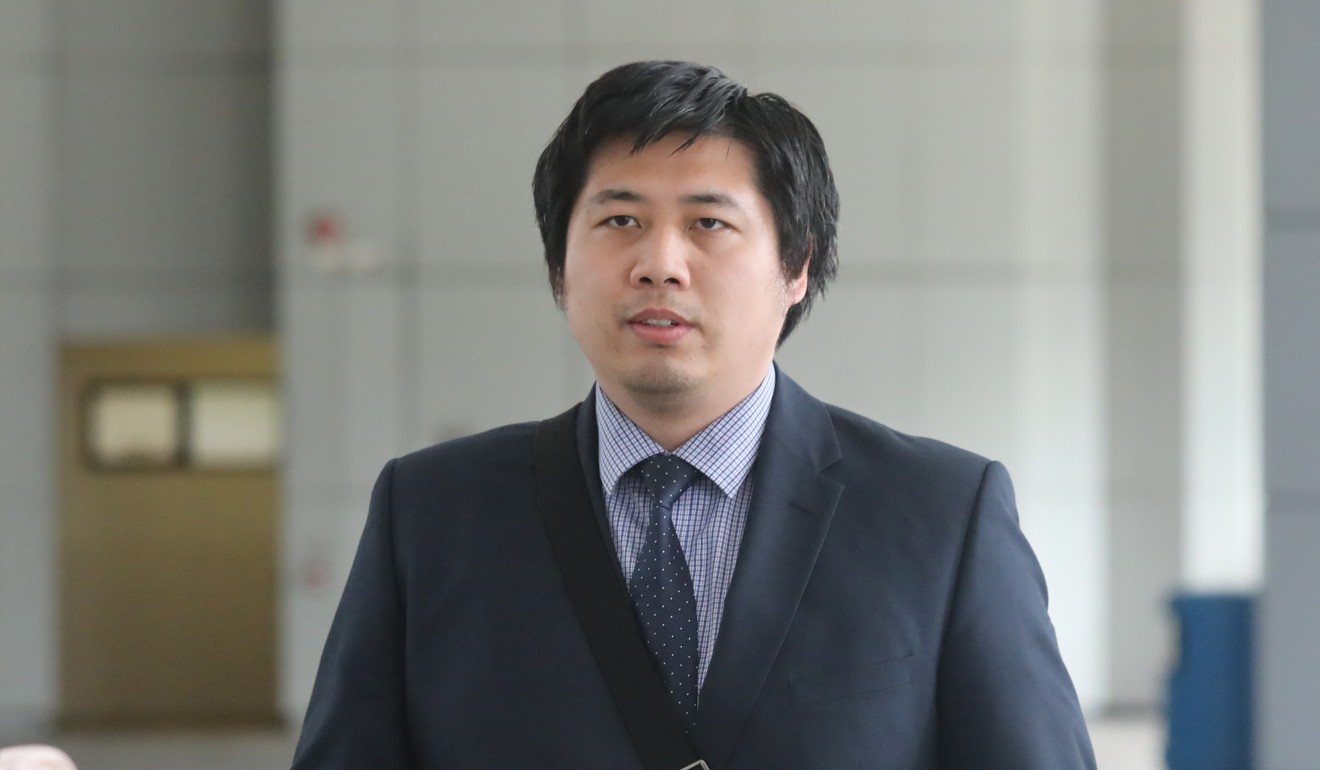
Prosecutors said during the trial that Leung took part in the riot at Portland Street by encouraging the crowd through a megaphone. He also took part in the clashes, they said.
But Leung told the jury during the trial he was only trying to ease the tension between the police and the crowd at the time.
A police spokesman said that, to date, 91 people – 80 men and 11 women, aged between 14 and 70 – had been arrested over a string of suspected offences related to the incident, from rioting to arson and possessing an offensive weapon.
Of them, 64 had been prosecuted while three absconded, including Roy Wong Toi-yeung, another leader from Leung’s Hong Kong Indigenous Group. Wong was a defendant in Leung’s trial last year before he disappeared.
Don’t forget the real heroes of Mong Kok riot
At least 27, on the Post’s count, have been found guilty in court. Twenty six others were freed after police sought legal advice from the Department of Justice, according to a police spokesman.
A group of 11 parliamentarians from around the world issued a joint statement to criticise the Department of Justice’s decision to retry Leung in the first place, and said he did not deserve such a lengthy sentence for the charges of which he had been found guilty.
The lawmakers, from Germany, Britain, Malaysia, the Philippines, Myanmar and Canada, also called on the Hong Kong government to reform its Public Order Ordinance, under which protesters were caught up in, saying that law was vague, arbitrary and in violation of international human rights standards.


